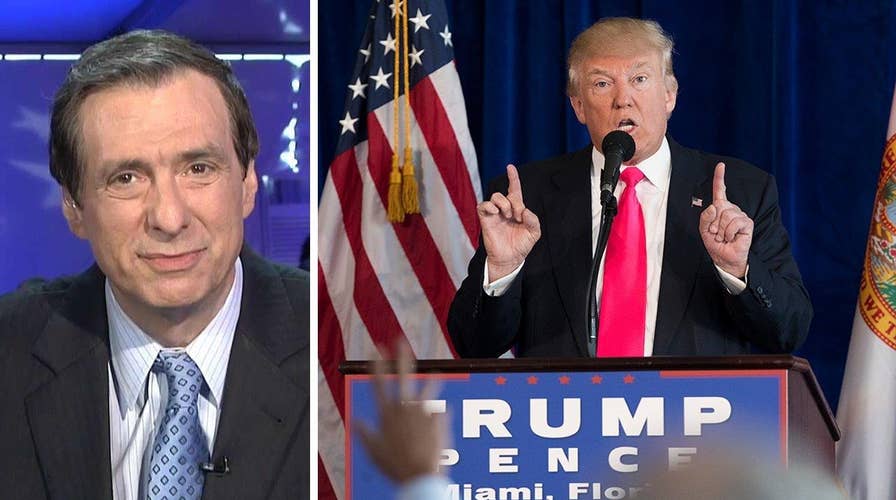Kurtz: Trump steals the spotlight (again)
'MediaBuzz' host Howard Kurtz reacts to Donald Trump briefly upstaging the DNC by making a speech in Florida
The uproar over Donald Trump’s latest comments is a classic case of media-generated outrage.
All over the newspapers, all over the airwaves, there is shock and horror that Trump would appeal to Russia to furnish Hillary Clinton’s hacked emails.
The lines seemed so obviously sarcastic to me, as I watched Trump’s presser from the Democratic convention here in Philadelphia, that I didn’t see the tsunami coming. Maybe I’m wrong, but as a longtime Trump-watcher, that’s how it came off to me.
But think about the media coverage for a minute. To believe that the Republican nominee was dead serious in urging an adversary of the United States to commit or complete an act of espionage against his Democratic opponent is to believe that Trump is clinically insane.
And I do think many journalists and commentators view him as a bit unhinged. That’s why this makes sense to them. They think Trump is so off the wall that it seems perfectly plausible.
Others, I believe, don’t believe Trump really meant it, but they think he stepped in it with the remarks and are happy to bash him over it.
Look, Trump says a lot of incendiary things. His comments on Mexicans and Muslims and the like get him into trouble and are more than fair game for criticism. But this one is different.
“Russia, if you’re listening, I hope you’re able to find the 30,000 emails that are missing,” Trump said. He added that the press would love that.
Trump is a master, of course, of saying things that are just far enough over the line that he drives a story for days. In this case, it means keeping a focus on the 33,000 emails that Clinton deleted from her private server as pundits and politicians debate whether he crossed a line—siphoning covering from the convention speeches by President Obama, Vice President Biden, Bill Clinton and others.
Trump now says he was being sarcastic and we don’t even know whether the Russians are behind the hacking.
What’s striking about the coverage is that it barely acknowledges that this could be an open question:
The New York Times headline: “Donald Trump’s Appeal to Russia Shocks Foreign Policy Experts”:
“There is simply no precedent for this: A presidential candidate publicly appealing to a foreign adversary to intervene in the election on his behalf.”
The Washington Post lead: “Republican nominee Donald Trump pleaded directly Wednesday with the Russian government to meddle in the U.S. presidential election by finding and releasing tens of thousands of private emails from his Democratic opponent, Hillary Clinton — an extraordinary and perhaps unprecedented maneuver in American politics."
Politico’s lead: "Donald Trump's call on Russia to hack Hillary Clinton's emails has shocked, flabbergasted and appalled lawmakers and national security experts across the political spectrum, with one saying it was ‘tantamount to treason.’”
“Is it possible that Trump was being sarcastic? That he was joking?” CNN’s Carol Costello asked her panel. The response was no, and even if he was, it wasn’t funny.
This is why professional politicians avoid sarcasm, to avoid uttering words that create an uproar. But Trump delights in it, which is why his supporters love him, his detractors view him as reckless and the media can never seem to get enough.






















